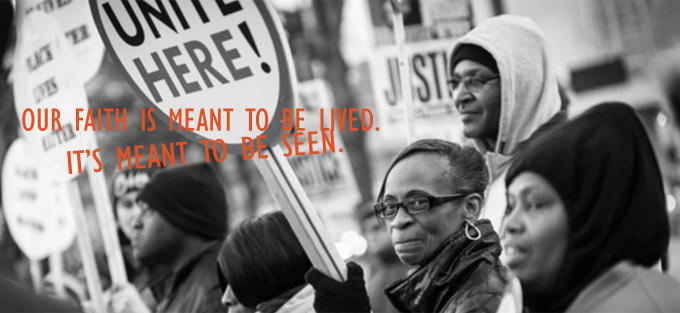by Collette Broady Grund
I was raised to be concerned about the poor and disenfranchised. In the Broady family nightly devotional time, we often talked and prayed about famine in Ethiopia, the demands on our local food pantry (started by my grandparents), and how giving our time and money might make a difference. It is clear from my earliest memory that being a person of faith meant caring for our neighbor, especially those struggling with basic needs.
When I went to college and began my social work classes, I learned to see those neighbors in the context of a socioeconomic system. My loving acts of charity would help for a moment, but would not fix the larger problems that had caused their need in the first place. The changes that would make a lasting difference were bigger: improving education, increasing opportunity, raising minimum wages and safety standards. Suddenly, my faith was political. And though it was uncomfortable (and still is!), I found that I wasn’t alone.
There were Christians across the political spectrum who wrote and spoke convincingly about the way their faith drove their political opinions and actions. Some of them acted in radical ways that I found simultaneously frightening and convicting. Most importantly, I began to understand Jesus as political. His words and actions challenged the governing bodies of his day, in both religious and secular circles. He called out the powerful for their wrongs and proclaimed a way that would turn the system of his world on its head. He stood with the poor and marginalized, ignoring the criticism of the religious elite.
Jesus had a clear agenda, with equally clear political ramifications. There’s a reason he was executed.
Faithful words and actions
I began to realize that if this is the way, the example, the person I am called to follow, my faithful words and actions would have political ramifications too. Looking back over the years since awakening to the politics of faith, I can see several times when I knew that God’s agenda needed a voice, and God was choosing mine (much to my consternation).
When I was in seminary, we in the ELCA talked about ordaining people in LGBT relationships. The ELCA’s final decision to allow rostered clergy to be in committed, same-sex relationships didn’t come until five years after my ordination. Before that, I expressed my faith by speaking from the pulpit about the wrongs being committed by not allowing my friends—as capable and called as I—to speak from the same pulpit.
In my first call, I supported and stood by a woman recovering from domestic violence. I was pastor to her children who were affected by that violence on a weekly basis.
When Minnesota considered a constitutional amendment to ban gay marriage three years ago, my public faith meant dusting off my little-used clerical collar to appear before the media on television to voice my opposition.
 This year, in the midst of national turmoil that some are calling the new civil rights movement, my political faith looks like preaching about repentance for the sin of racism to a majority White and privileged congregation. It looks like organizing my first prayer vigil in response to the Charleston shootings. It looks like writing blog posts and this article. What it looks like for you, I cannot say. Each of us needs to find our publicly faithful voice because each is unique.
This year, in the midst of national turmoil that some are calling the new civil rights movement, my political faith looks like preaching about repentance for the sin of racism to a majority White and privileged congregation. It looks like organizing my first prayer vigil in response to the Charleston shootings. It looks like writing blog posts and this article. What it looks like for you, I cannot say. Each of us needs to find our publicly faithful voice because each is unique.
However, there are two guiding questions I’ve learned to ask myself when deciding whether to speak out as a Christian. They help me distinguish between action that is faith-based and actions that come from my own agenda.
The first is: Do I sense a calling from God to speak or act in this way? In all of the instances listed above, I had an overwhelming sense that I should act outside my comfort. I knew following that instinct would mean conflict, but the more I prayed, the more it felt like there was no other option. The call of God through the prompting of the spirit is not easily ignored.
Once I determined that God was calling me to action, the second question I asked myself helped me figure out how to act. I asked: Am I loving my neighbors the best I can as I speak and act even if they disagree with my words and deeds?
Asking this question kept my words and actions kind, even when they were challenging. Certainly, there have been times I haven’t measured my public life against those two rubrics. Yes, I’ve spoken out of my own ego and frustration. You can imagine how that turned out!
For you, too, it may take some trial and error, and it will certainly take a lot of prayer and courage, but our faith is meant to be lived. It’s meant to be seen. Jesus called us light for the world, like a city on a hill that cannot be hidden, shining like a beacon to all those looking for justice, for redemption, for grace.
Discussion questions:
1. What does or might a publicly noticeable faith look like in your context?
2. What keeps you from acting out of your Spirit-given convictions?
3. From whom or what can you draw courage when you face those barriers?
Closing prayer:
O God our way, you sent Jesus to show us what a life lived in you can look like. Encourage us by his example, and strengthen us by your Spirit, that we may live a life that shows your love and mercy to those around us. In the name of Jesus, we pray. Amen.
The Rev. Collette Broady Grund lives in Mankato, Minn. with her husband, their four children and two dogs. She serves Bethlehem Lutheran Church (ELCA), and blogs at The Broady Bunch.
Photos by Dorret and Sparetomato. Used with permission.


Thanks. I speak out a lot and I feel that it is so important for me to do so. I enjoyed hearing your perspective.
Well written view. I fear you have called me out of my comfort zone. Thanks, I think. 😉
Last evening I was reading an article about women in scripture who took great risks,i.e. Mary in anointing Jesus, woman touching the hem of Jesus’s garment,
the widow’s might etc. I wants use the article for writting a message at a Thankoffering service. Can you help?